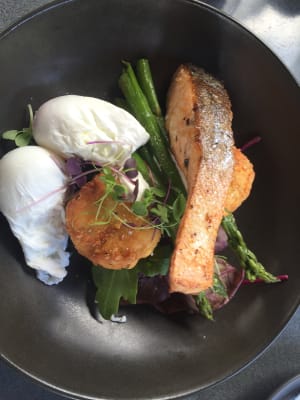
Never has a macronutrient been so popular; from bodybuilders to weight loss fanatics and everyone in between, protein is on everyone's mind. Often its the first question people ask when they discover I'm a Dietitian. What Protein powder do you use?
If I can try and keep it a little more simple for you, explaining what protein does in the body, why we need it, and how it's best consumed.
Firstly, protein is essential to human life, along with carbohydrate and fat. We ingest protein by eating other animal tissue such as beef, chicken or fish, but we can also obtain it in smaller amounts via plant-based sources such as chickpeas and red kidney beans.
Its role in the body is integral to enzyme production, immunity, new tissue growth, and muscle development. It's a fascinating thing that body of yours, right now if you've gone a long period without food, you will be breaking down your muscle tissue for energy. We are in a constant see-saw of protein synthesis (building) or protein degradation (breakdown).
In the undergrad days, the calculations were pretty simple. You get someone's weight, plug that into a formula and based on several assumptions; you knew 0.8-1.2g/kg of body weight of protein meant most human's were good to go. These figures focused on muscle maintenance and functions within the body; even in some cases, it was enough to build muscle. The term muscle mass often brings to mind images of Arnie and his mates with rippling biceps and fake tan, but in health, muscle mass and its maintenance are linked with a higher quality of life outcomes when measured across the lifespan. As we age, if we move, perform weight-bearing activity and importantly eat enough protein regularly, the data shows, we win! Less broken bones, less incidence of chronic disease = more life, more function, more choice!
Interestingly, when you delve into nutrition science, protein is more about optimising the eating occasion than the overall amount for the day. It appears that when we eat 0.2-0.3g of protein per kilogram of body weight per meal, we start to optimise our response to the training stimulus. In my sort of language, we get more bang for our buck! When we eat beyond these amounts, it appears the mechanism used for muscle development switches off, and the excess protein is metabolised for energy, not muscle development. Like most health and fitness theories, protein is more about little bits often rather than binges, fads, and silver bullets.
What does that mean in terms of actual food in each meal?
Let's use Kirra as an example;
Kirra is a 38 year old new to fitness,
exercising 3-4 times per week in a mixture of resistance and cardio type sessions.
She doesn't weigh herself, but Kirra would probably be about 65-70kg if we guestimate.
Her eating occasion protein recommendation would be 14-21g protein per meal.
If we are attempting to gain muscle, then we can eat up to 1.5-2g/kg of body weight per day. That means up to 100-140g per day. If we were to eat 14-21 grams of protein per meal across our five meals (three mains, two snacks), we would achieve precisely that. So what's on the menu?
Breakfast: 2 poached eggs on toast (15g Protein)
Morning Tea: 1 x YoPro yoghurt (15g Protein)
Lunch: Seasoned Chicken (100g) grilled on quinoa, pumpkin and spinach salad (25g Protein)
Afternoon Tea: Red Bean Bliss Ball x 2 (25g Protein)
Dinner: 100g lean steak - grilled, sweet potato, asparagus and garden salad (25g Protein)
Tallied altogether, you will see we are at the lighter end of the recommendation (105g). With this menu, we give Kirra a bit of wiggle room if there were a latte or 2 in there, perhaps some supper, the bonus dairy & meal providing additional protein. Best of all, though, with such a regular pattern to her protein delivery, that see-saw would lean more in favour of protein synthesis, i.e. muscle building than breakdown.
Next time you get asked to jump on the see-saw in the playground, ask for some grilled chicken first :).
Yours in health
Sean Cornish



